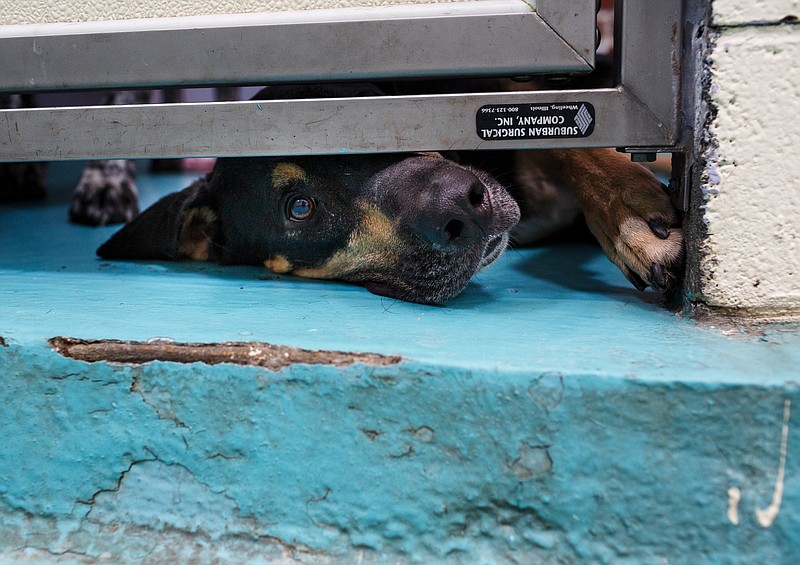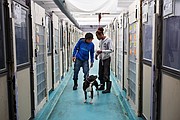Within the maze of walkways at Chattanooga's Humane Educational Society, there's a 60-foot room with multiple cages designed for the hundreds of dogs that stream into the shelter each year. But on a recent day, some of the containers were empty - and not for a good reason. Outside, temperatures were moderate with rainy skies, but inside, the room was frigid by comparison, and the standing water in the cages pointed to why they were not in use.
"Look at this," said Hamilton County Commissioner David Sharpe last Friday, as he pointed to a chunk of ceiling missing as he entered the room. "There's water coming right through the roof."
Moments later, Sharpe turned the corner with fellow Commissioner Greg Martin and saw a trough that was an open sewer for animal waste.
"It would be hard to describe this to anybody," Sharpe said.
The shelter is in bad shape, and its leaders say the 118-year-old facility, which used to be an orphanage, must be replaced.
Sharpe and Martin were among seven of the nine county commissioners who recently toured the facility, HES Executive Director Bob Citrullo said.
The Hamilton County Commission is scheduled to vote Wednesday whether to invest $10 million in a new animal shelter for the humane society, which provides animal control for all of Hamilton County except the city of Chattanooga. The county will use money generated by the 2017 tax increase that was placed in a capital projects fund at the time of the resolution last September approving the tax increase.
The plan calls for a 36,000-square-foot animal shelter on 6.8 acres in the area of Bonny Oaks Drive and Highway 153. The cost is estimated at $13 million.
Of the 4,969 animals the society took in in 2017, 72 percent came from unincorporated Hamilton County, with the rest coming from smaller municipalities including Collegedale, Red Bank and Soddy-Daisy. The facility housing the animals has no heat on the main floor, rain pours from several locations inside the shelter, ventilation is minimal, and the furnace contains asbestos and is covered in black mold. Two years ago, engineers from Hamilton County told Citrullo that the facility needed to be condemned.
Hamilton County pays the Humane Educational Society $620,970 of the shelter's $1.9 million annual operating budget. Citrullo cites the positive trendlines of the program since his arrival in 2013. He said the society has seen animal adoptions increase from 812 in 2013 to 2,308 in 2017 and that the number of animals euthanized has decreased from 1,411 in 2013 to 521 last year. The shelter's live release rate is 89.1 percent, meaning that 89.1 percent of the animals coming to the humane society shelter are released back into a better environment, alive. That number was 66.7 percent in 2013.
By comparison, McKamey Animal Center took in 6,501 animals in 2017, had 2,910 adoptions and euthanized 1,197 animals.
"The fact that we are doing as well as we are right now is a testament to the people who work here, our volunteers and a commitment to saving lives," said Citrullo, who said the society has invested $1.1 million to maintain the current facility since 2013. "There is a big misconception that we are asking the county for a donation, which we are not. We are requesting the county help fund a facility to provide this service to its citizens."
At a recent meeting, dozens of volunteers and supporters wearing red shirts filled the commission's meeting room.
County Mayor Jim Coppinger told the commission, "It's the perfect time to consider addressing this need."
For some, the ask of $10 million is too much.
"I can't be for this in any fashion until we have a training facility for our police officers," Commissioner Tim Boyd said at last week's meeting.
Citrullo told the Times Free Press he knows it appears as if the $10 million appropriation suddenly appeared, but that the plan has been in the works for some time.
"We have been discussing this for three years with different people at the county," he said. "We've done our due diligence and studies that needed to be done, all paid for by the Humane Educational Society, because the board agreed three years ago that this facility was not sustainable."
___
The center has not been without controversy over the years.
In 2003, a furor erupted around the Chattanooga Humane Educational Society when local animal activists raised questions about the facility's euthanization rate. At the time, the society provided animal control for both Hamilton County and Chattanooga. Animal activists took their case for change to the Chattanooga City Council and then-Mayor Bob Corker.
Citrullo only knows what he has heard of that time in Hamilton County, and what he knows the state of the animal control industry was in the early 2000s.
"It was just literally a conveyor belt of death where they euthanized every day," he said.
Local attorney Cindy Hall was a board member at the humane society in 2003 and still serves today as its vice chairman. She remembers the public uproar well.
"I remember getting an email from New Zealand asking what in the world we were doing," she said.
Then in 2008, the city transferred its service to McKamey Animal Center when that shelter opened.
Ron Littlefield was in the second year of his first term as mayor of Chattanooga when McKamey opened, implementing a plan first developed by the Jon Kinsey administration and further developed under Corker's tenure. Littlefield served on the City Council during Corker's four years as mayor, serving both as chairman and vice chairman.
Former council member Jack Benson, Littlefield said, was the driving force to develop the plan between 2001-2004 after the rash of negative publicity. With the humane society participating, Littlefield said, planning for a new city-county facility moved forward and resulted in the city giving 10 acres of land on Access Road near DuPont, current site of McKamey.
"The land we donated was previously given to the city," Littlefield said. "Jack Benson had a heart for animals. He went to the Humane Educational Society when it first became an issue and came back horrified and said they were euthanizing animals in almost a production-line manner. It lit a fire under him to get something done. We started raising money and thought the HES folks were with us and would help. When they found out they were not going to be completely in charge of it, they seemed to lose interest."
Hall and current humane society board Chairman Dr. Tai Federico say the issue was more complicated than that, but that the final decision was, in part, one driven by the finances of the county. He believes the community benefits from having two well-run shelters.
"McKamey is doing the Lord's work, we are doing the Lord's work and the Lord has provided plenty enough work for both of us," Federico said.
Citrullo said things have changed at the humane society.
"I believe we are doing a much better job and the data shows that. The people we serve will tell you that and the public that volunteers with us will tell you that."
___
Both Citrullo and Volunteer Manager Jeanine Cloyd said a new, centrally located facility will dramatically expand the education part of the society's mission. That's difficult to do "when there are rooms in the facility literally shut off because they are a health hazard to people, much less the animals," Federico said.
Cloyd said she works with a core of 100 volunteers who are in the facility daily, another 100 dedicated to being on call and several hundred more who work events throughout the year.
She said the humane society offers orientation classes twice a month for volunteers, and the classes attracted one or two people, at most, several years ago.
"Today, we have people calling every day to sign up for a class, and the classes are full," Cloyd said.
"These volunteers see desperate people come in here with an injured animal and they see how we take care of them. That makes a big difference."
Contact Davis Lundy at news@timesfreepress.com.

